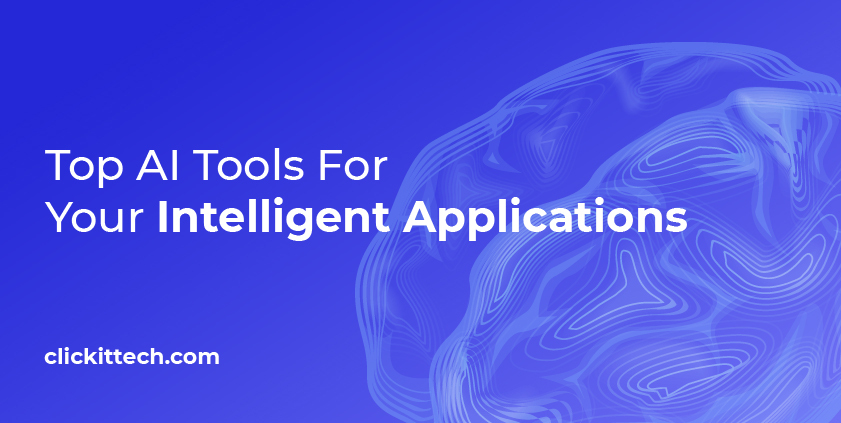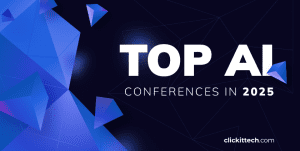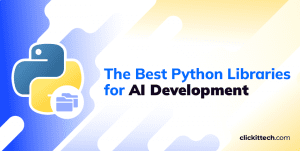Artificial Intelligence (AI) tools are being used for developers in every aspect of our daily lives, shaping how we live. For example, websites, apps with chatbots, recommendation systems, and conversational AI tools with text-to-speech functions are gaining popularity over traditional apps which are lacking such AI components.
In light of the foregoing, businesses are aiming to produce smarter applications with AI integrations that provide a more intuitive experience for customers, such as conversational AI. Thus, a huge demand has been created for Artificial Intelligence tools that enable developers with minimum AI knowledge to easily create Artificial Intelligence-based software.
What are AI Tools?
An AI platform is a suite of AI tools for developers to create intelligent applications. These platforms offer many AI functions, including Machine learning (ML) algorithms, speech and object recognition tools, Natural language processing (NLP), Big Data Analytics tools, conversational AI, and more.
Most of these platforms are cloud-based and capable of scaling to resource and data demand, allowing developers to build complex applications. The biggest advantage of these AI platforms is that they allow people with lower levels of AI-related technical knowledge to build AI software based on Artificial Intelligence tools.
Best AI Tools for Software
There are many different AI tools on the market, all of which have unique features. Let’s take a look at the best AI tools for developers you should look into in 2024.
- Rainbird
- TensorFlow
- Infosys Nia
- AWS AI Services
- Microsoft Azure AI Platform
- H2O.ai
- IBM Watson
- Wipro Holmes
- Google AI Platform
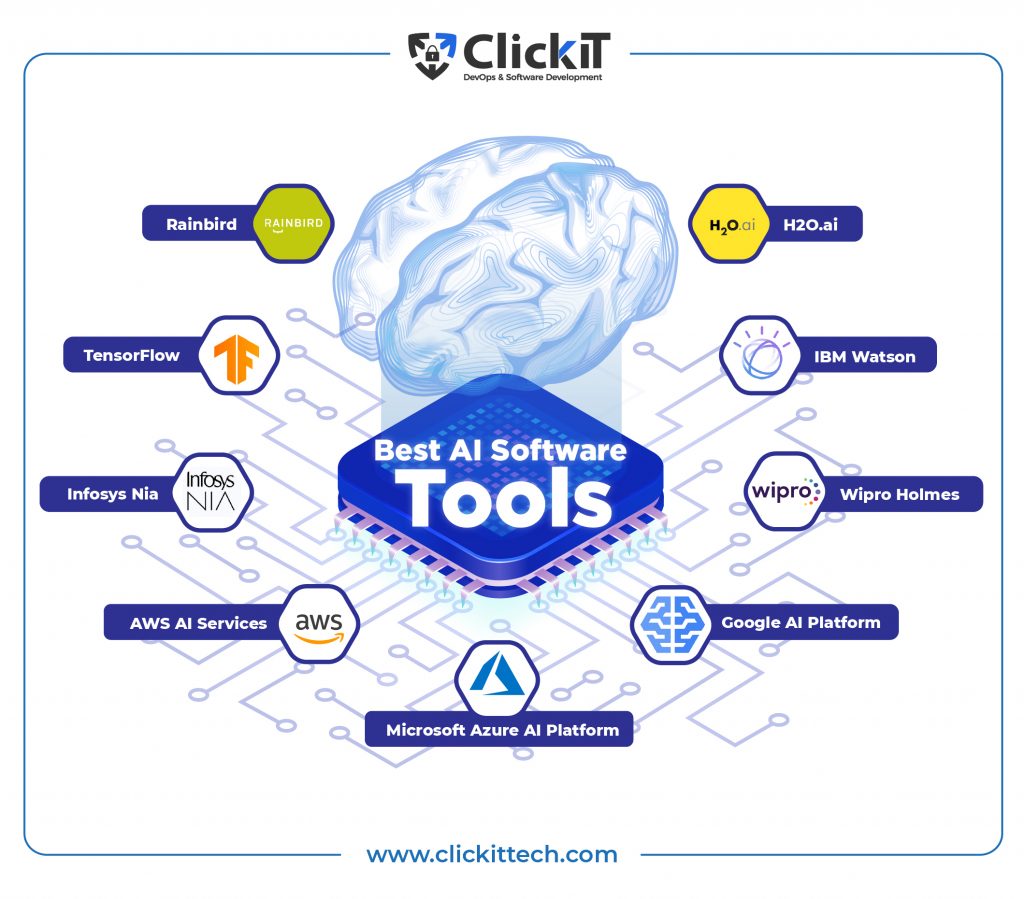
1. AI Tool: Google AI Platform
As part of Google’s research and technology, Google AI provides a collection of state-of-the-art open-source tools and APIs for creating Artificial Intelligence tools.
Machine Learning with AutoML
AutoML is one of the best solutions if your business doesn’t have the required expertise to build ML models. It’s a tool that allows you to train and deploy custom machine learning models in a matter of minutes. It’s also deployable to Google Cloud Platform (GCP) or any other cloud platform.
Speech to Text and Vice Versa
The conversational AI platform offers APIs enabling developers to convert speech into text and text into speech using neural network models. Developers can choose trained models specific to their domain and enable voice control and video transcription features in their solutions. They can enhance the accuracy using domain-specific words or phrases. Furthermore, this platform provides facilities that auto-convert numbers into dates, currencies, addresses, etc.
Natural Language Processing with DialogFlow
The NLP of Google AI uses ML to analyze unstructured data and derives insights without writing a single line of code. NLP functions also provide next-level conversational AI platform with DiagFlow using state-of-the-art virtual agents. Developers can use DialogFlow to build chatbots and voicebots that partake in life-like conversations with customers. DiagFlow also allows developers to connect with a community of over 1.5 million other developers.
Image Insights with Vision AI
Vision AI is a tool for deriving insights from images that lets developers build emotion detection software using pre-trained vision API models. Developers can also build software for an object, a face, and handwriting detection using ML models with higher accuracy.
2. AI Tool: Microsoft Azure AI Platform
The Azure AI platform provides AI and data science tools based on breakthrough research such as the Google AI platform. Its AI models and simple APIs enable developers to create high-quality and innovative apps that can serve multiple uses.
Machine Learning
Azure ML is a Python-based ML service for training and deploying ML models. You can choose tools such as Jupyter Notebook, automated machine learning, and drag-and-drop designer for development. Additionally, it provides support for open-source frameworks and libraries such as MLflow, Kubeflow, ONNX, and PyTorch. Its Machine Learning Operations (MLOps) enable you to deploy and manage thousands of models in the cloud, on-premises, or at the edge.
Knowledge Mining
The Azure AI platform offers Azure Cognitive Search, which gets insights from multiple sources of content such as documents, images, and media. It’s an excellent platform for easily building sentiment analysis software, pattern discovery, and uncovering hidden relationships in data.
Conversational AI
Azure Bot Service enables organizations to develop high-quality bots which provide a conversational AI experience for customers. Bots can be multilingual and multimodal and support multiple use cases. Furthermore, you can connect the bots to multiple channels, such as telephony and Microsoft Teams, with minimum effort.
Document Process Automation
Developers can build automated information extraction apps using Azure Form Recognizer. It uses advanced ML models to extract information from documents such as text, key-value pairs, tables, and structures. Users do not require any manual labeling. Moreover, Azure Form Recognizer provides flexible deployment in cloud and edge environments.
Machine Translation
Azure AI supports instant text translation into more than 100 languages using innovative machine translation functions. It also supports batch-wise text translation. Developers can therefore build software for different machine translation use cases, including call center translations.
Speech Transition
Azure provides several tools for speech transition. It enables text-to-speech and speech-to-text translation using Speech services. Developers can quickly create voice-enabled applications using its Speech SDK function. Furthermore, its Speech studio function allows developers to create custom models.

3. AI Tool: TensorFlow
The next tool on the list of best AI tools is TensorFlow. TensorFlow is a collection of libraries, tools, and resources for machine learning. Many researchers worldwide use this platform to build state-of-the-art ML models.
Open Source
TensorFlow is an open-source ML library used for building high-quality and accurate ML-based applications. Therefore, TensorFlow offers the flexibility required to solve ML problems in multiple ways, which means developers do not have to depend solely on the specific capabilities provided by vendors.
Highly Scalable
DTensor of TensorFlow enables distributed model training across multiple devices to increase scalability. It supports parallel training using data partitioned across distributed devices and Parallel spatial training that parallelizes the model features across the devices.
Easy Model Building
TensorFlow enables easy model building by allowing high-level APIs such as Keras, which provides quick debugging and model iteration capabilities. TensorFlow is available in many programming languages however, Python is the most popular one. Basically, you can use any programming language to build a model. Each model is easily deployable to the cloud, on-prem data center, and even to your device or browser.
Worldwide Community
TensorFlow has a large community, including many researchers and developers who use it to solve a variety of ML problems. Therefore, even new TensorFlow users can receive support and learn how to solve real-world challenges.
An Extensive Set of Tools
TensorFlow also offers an ecosystem of tools that allows developers to make their AI tasks easier. For example, some of the most valuable tools include; Colab Jupiter Notebook, Tensorboard (for visualization), and Ml Perf (for benchmarking performance).
4.AI Tool: IBM Watson
IBM Watson is IBM’s suite of AI tools, applications, and solutions developed to enable individuals and organizations to be able to easily adopt AI. It’s used in various applications, from cancer detection to customer services.
Watson Assistant
The IBM Watson Assistant used for conversational AI is one of the most intuitive AI tools on the market. Enables conversational AI bots to provide accurate, quick, and consistent answers to consumers. Watson Assistant eliminates the risks associated with creating unhelpful chatbots and many other complications that can arise when the bots are deployed in production.
Search and Text Analytics with Watson Discovery
Text analytics are essential to understanding hidden insights in large amounts of data. Watson Discovery is an AI-based search and text-analytics platform that uses innovative natural language processing to analyze text in sources such as documents and web pages to uncover useful hidden insights.
Natural Language Processing
IBM NLP enables businesses to service insights from various sources. The NLP tool uses ML to visually label text, tables, and images and uses IBM cloud park. These tools can easily deploy models to any cloud environment.
Speech to Text and Vice Versa
IBM Watson Speech to Text is used for building accurate and efficient speech-to-text and text-to-speech translation in a variety of languages. It has multiple uses, including customer self-service, agent assistance, and speech analytics.
Language Translator
The IBM Language Translator can identify any language while translating documents, webpages, and many other text resources. Language Translator allows developers to translate text to speech and build apps such as multilingual chatbots.
Learn more about the Top SaaS Trending Apps.
Natural Language Classifier
IBM Natural Language Classifier assists users with understanding the language of short texts. First, the classifier will learn how to classify similar content from a set of trained test data. Next, using the same classifier model, the user can classify the untrained data. Sadly, this service will no longer be available as of August 2022.
5. AI Tool: Infosys Nia
Infosys Nia is the successor of its AI platform Mana, the robotic process automation technology. This next-generation integrated AI platform provides tools for machine learning, data science, knowledge management, and more.
Machine Learning Platform
Infosys Nia provides a wide range of ML algorithms for building efficient and scalable Machine Learning models. Nia helps build important apps which are used for revenue forecasting, customer behavior analysis, compliance, risk analysis, and more.
Knowledge Processing
Nia is capable of building knowledge models from labor contracts with ML and Deep Learning.
Cognitive Automation
Nia enables the development of AI chatbots providing access to your knowledge repository, and the conversational AI interface allows you to automate various actions.
Big Data Analytics
Nia DocAI uses AI technologies such as ML and NLP to derive insights from multiple and large document data, including creating invoices, receipts, questionnaires, and financial statements. This platform optimizes processes like extraction and document processing to help businesses quickly discover hidden insights.
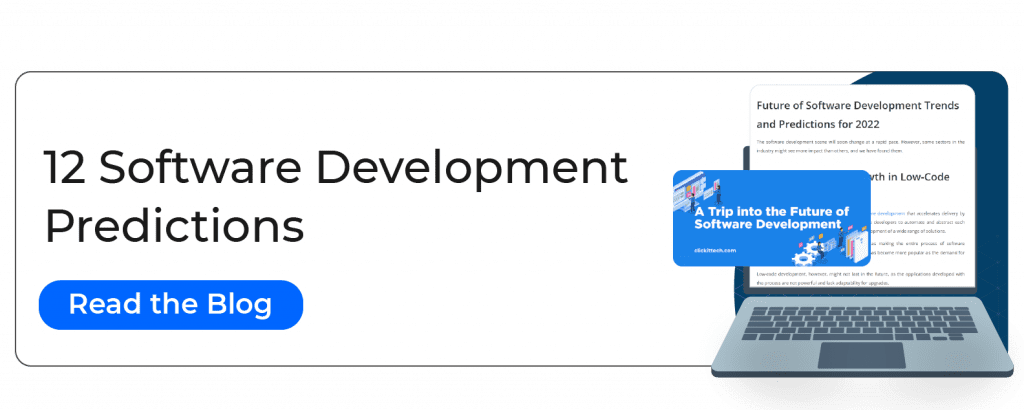
6. AI Tool: AWS AI Services
The AWS cloud platform offers a range of ready-made AI services developers can leverage to build complex AI applications. Most of their ML services use deep learning technology that helps them achieve higher accuracy.
Machine Learning
The Amazon SageMaker platform builds, trains, and deploys machine learning models for various business use cases. It enables developers to retrieve, label, and process a high volume of structured and unstructured data. You can also accelerate the ML training using its optimized infrastructure and MLOps to deploy and manage created models.
Text Analytics with AWS Comprehend
Amazon AI provides NLP capabilities with AWS comprehend, a service that enables deriving valuable insights from documents. An NLP workflow comprehends the process of the text by extracting information and conducting further analysis. This service is excellent for developing apps integrating sentiment analysis and analyzing customer interactions.
Fraud Detection with Fraud Detector
Developers can use a fraud detector service that uses ML in order to detect online fraud. Thankfully, developers do not need prior ML experience to train and deploy fraud detection models. These models are accurate as they were built using insights from historical data and Amazon’s expertise.
Text to Speech with AWS Polly
Another Amazon AI service is Amazon Polly which allows the creation of life-like apps that talk by converting text into speech. Polly uses advanced deep learning technologies for synthesizing human voices which results in a very natural sound. You can use Polly to create speeches in a broad set of languages. In addition, it supports Neural Text-to-Speech (NTTS) which allows it to deliver a high-quality speech.
Video and Image Analysis with AWS Rekognition
AWS Rekognition allows you to analyze millions of images and videos for your applications. With this tool, you don’t need to build an ML model from scratch seeing as it provides pre-trained or customizable computer vision APIs. This fully managed service by Amazon provides a variety of features, including content analysis, face detection, and event detection from streaming videos.
7. AI Tool: Rainbird
Rainbird is next on the list of artificial intelligence tools, a relatively new AI platform with evolving technologies. Rainbird consists of three modules: Rainbird Infer, Rainbird Flow, and Rainbird AutoML, each of which is accessible through Rainbird Studio.
Rainbird AutoML
Rainbird AutoML is a new AI module for training and deploying ML models. You can use the outcomes of the trained model with the Rainbird Infer to get more accurate and high-quality predictions.
Rainbird Infer to Automate Human Decision-Making
This module automates the decision-making process using a powerful inference engine. Also, the knowledge maps allow users to create visuals for the decision logic.
Rainbird Flow for No-code Workflows
Rainbird Flow is used for creating workflows without having to write any code. It enables the creation of end-to-end solutions for complex decision-making.
8. AI Tool: Wipro Holmes
Wipro Holmes provides AI-powered customizable solutions by applying augmented intelligence. It provides developers with various AI tools, from speech recognition to robotic automation.
Speech Recognition and NLU
Wipro Holmes enables the creation of apps that use speech recognition and NLU, such as customer support and collaborative agents.
Patterns Discovery
The predictive systems of Wipro Holmes allow knowledge extraction from various sources for pattern discovery. Its Holmes Studio is a low-code or no-code AI platform used for creating and deploying scalable AI models with minimum expertise. Businesses can use these models for business outcomes, trend prediction, and pattern discovery.
Cognitive Process Automation
Wipro Holmes allows the creation of business process automation solutions that increase the value of a business using AI-driven scalable processes.
Visual Computing Applications
These applications allow users to build visual computing applications with features such as image recognition, video processing, and object recognition.
Robotic Automation
Wipro Holmes enables Robotic Process Automation (RPA) which automates various everyday tasks such as form filling, image and text processing, and other repetitive processes.
9. AI Tool: H2O.ai
H2O.ai is a Cloud-based AI platform that solves complex business issues using various AI tools based on ML and deep learning models.
AutoML
The extensive automated ML capabilities allow the creation of highly accurate AI models and applications. Its intuitive AI app store allows developers to easily distribute innovative applications to customers. These models can operate in on-premises data centers, cloud environments, and other data sources.
Natural Language Processing
The Driverless AI of the H2O.ai platform transforms text into meaningful features using document features extraction methods such as TFIDF, CNN, and GRU. This feature consists of advanced NLP techniques which can build models by processing a large volume of text data. Driverless AI is a useful AI tool for developing apps like document classifiers and sentiment analysis systems.
Fraud Detection
The best use case of H2O.ai capabilities is fraud detection. High-quality ML models can detect fraud patterns in large volumes of transactions and use them for real-time fraud detection. Due to their high accuracy, the H2O.ai models are being used for fraud detection within the financial and insurance industries.
Conclusion
Nowadays, Artificial Intelligence tools are used by developers to create AI-driven applications. There are a lot of AI tools available on the market. This article presents what we believe to be the nine best AI tools for developers available as well as their key features.
These top Artificial Intelligence tools offer a range of features for machine learning, NLP, conversational AI, and pattern discovery and are used to develop smart applications across various industries. ClickIT is the best place to manage your Artificial intelligence tools and AI projects in the cloud. As an AWS partner, we can help you automate your activities in the cloud. Check out our services on the AWS cloud.

FAQ
Libraries such as Scikit Learn, Tensorflow, Theano, Keras, MxNet, and PyTorch and platforms such as Google AI, Azure AI, Amazon AI, Ho AI, and IBM Watson.
Deep learning and Generative Adversarial networks are the latest artificial intelligence technologies used in many research projects and applications. These technologies are mainly used for computer vision-based applications.
Google’s AlphaGo, designed by the Google DeepMind team, is known to be the smartest AI on the market. This AI tool was actually able to beat human players in a game of Go.
-Grammarly
-Jasper
-INK Editor
-Wordtune
-ProWritingAid
Several AI writing tools could save you much time in content creation and optimization. Here is a list of them below.
–Prepostseo
–Paraphraser
–Summarizing tool
–Rephraser
–Rewording Tool

